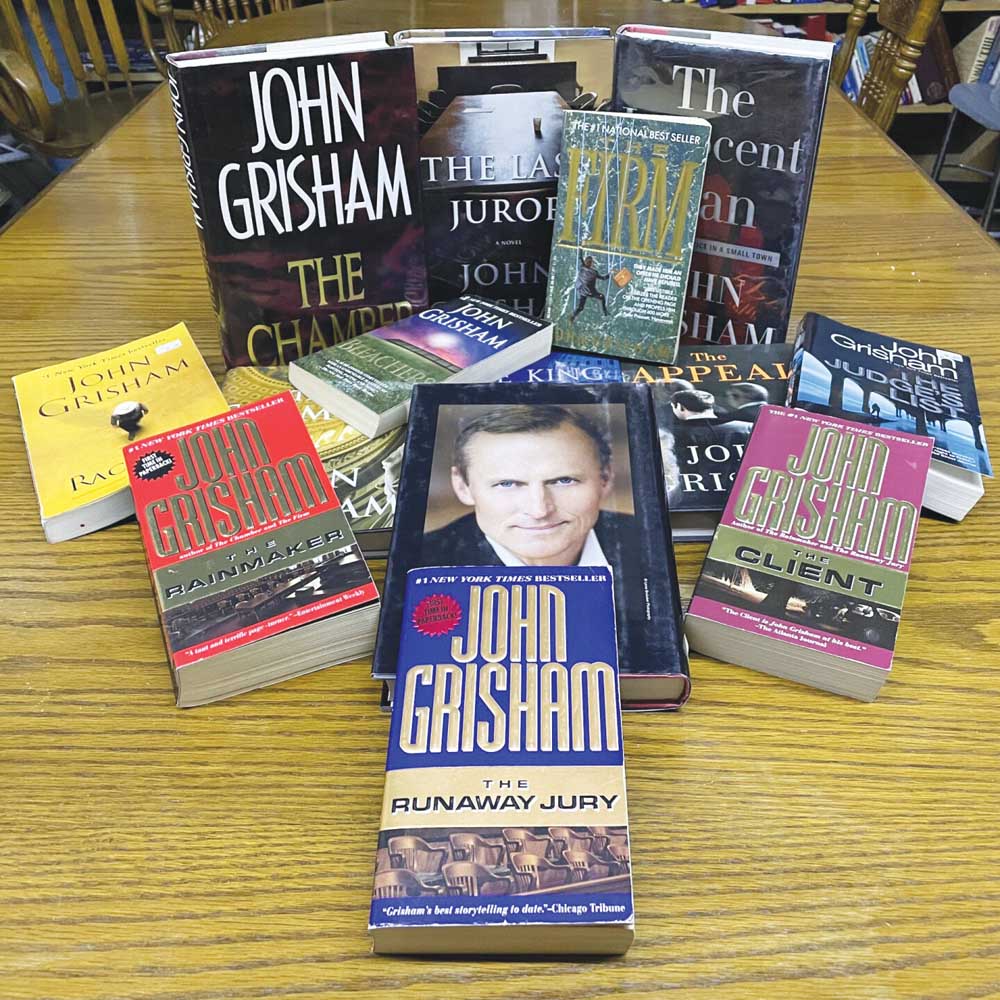John Grisham’s work, ranked
Published 10:00 am Thursday, November 7, 2024

- Grisham Books.jpg
John Grisham has published 61 solo-authored titles, and I’ve read them all in the last six months. For your reading pleasure, they are here listed from worst to best:
Trending
61. The Brethren (2000)
Grisham sidelines a fun premise about jailed ex-judges in favor of “the gay crime” (no satire detected) — not clever, just gross. The political plot is weirdly prescient of the Bush administration and its response to 9/11.
60. The Associate (2009)
A generic, detail-oriented legal espionage thriller is torpedoed by its lead heroically dodging legitimate allegations of sexual assault, with Grisham himself throwing in a healthy dose of misogyny. Ew.
Trending
59. The Tumor (2015)
Grisham has stated that his essay touting an experimental cancer treatment is the most important thing he’s written. It’s too bad it reads like a scare film, has the nuance of an infomercial, and cites no credible sources.
58. Witness to a Trial (2016)
This brief short story, which precedes the main plot for “The Whistler,” rapid-fires Grisham’s routine plot points for a person falsely convicted of capital murder, and that’s it — the product of going full auto-pilot.
57. Theodore Boone: The Accused (2012)
Theodore Boone solving his attempted framing is the series at its most dull, and its most whiny. At least there’s always the animal court interlude, I suppose.
56. Fetching Raymond (from “Ford County”)
This tale of a family witnessing their kin’s final, denial-ridden moments before his execution fails all attempts at poignancy, succeeding only in being incredibly grating — its dashes of irony get it basically nowhere.
55. The Broker (2005)
The CIA, all manner of hitmen, a globe-trotting man on the run and the highest stakes imaginable make for rather stale proceedings. If one wants to visit Italy Grisham-style, they should try “Playing for Pizza.”
54. The King of Torts (2003)
Grisham’s cautionary tale of a man swept up by the temptations of mass tort litigation is passable, maybe, but in the end one is merely amused that the book earnestly revolved around a drug that makes you murder people.
53. Theodore Boone: The Abduction (2011)
Theodore’s second outing struggles to maintain a believable tone as it waffles between kid play and, like, decidedly mature kinds of implied violence. The ultimate resolution makes up for some of this, but not all.
52. Skipping Christmas (2001)
Grisham’s attempt to spawn a new Christmas classic is somehow simultaneously cynical and sanguine. It’s a mess, I don’t hate it, it’s so weird…bottom line: I never want to live anywhere with an HOA.
51. Blood Drive (from “Ford County”)
The opening entry in the “Ford County” collection sees a trio of boondockers get into a series of increasingly pathetic hijinks. It’s funny, sort of, but more than anything it’s slight.
50. Homecoming (from “Sparring Partners”)
This novella sequel to the short story “Fish Files” is Grisham’s attempt to turn a previously cynical tale sweet. However, what we’re ultimately offered is the only uninteresting episode of Brigance and Co.’s lives to date.
49. Theodore Boone: The Fugitive (2015)
Grisham’s big climax to the murder trial plot from his first outing with the Boones has a bunch of wish-fulfillment fantasy bits, including some absolutely ridiculous coincidences, and little else.
48. Theodore Boone: The Accomplice (2019)
The final entry in the Theodore Boone series is…fine. It’s fine. There is nothing offensive nor remarkable about — and more than any other I scarcely remember — this book. It is fine.
47. Michael’s Room (from “Ford County”)
This account of a lawyer kidnapped by those he’s screwed over and forced to reckon with his moral bankruptcy is very straightforward and decidedly depressing. It’s not bad — just a bummer.
46. Gray Mountain (2014)
Grisham has perhaps never been more heavy-handed than in this, his condemnation of strip mining in rural Appalachia that also has some plot and characters. Plenty of righteous anger, but a superficial effort otherwise.
45. The Summons (2002)
There’s not much to the story of two brothers grieving an overbearing patriarch while dealing with an unexpected load of cash, but it is nice to visit Ford County for the final time, chronologically (so far, anyway).
44. The Reckoning (2018)
Grisham’s single most ambitious novel is a murder mystery/war epic/family melodrama that, when it comes down to it, is founded in some really ugly ideals (the racist stereotypes don’t help matters).
43. Sparring Partners (from “Sparring Partners”)
This novella about an overworked associate dealing with her two bosses’ tomfoolery is, aside from a couple plot flourishes, a tad unremarkable, not to mention that it’s essentially a remake of “The Litigators.”
42. The Guardians (2019)
Grisham takes on capital punishment yet again in a novel that, on its own, makes for a pretty good read. However, if one is familiar with Grisham’s other writings on the subject, it may evoke a rote, repetitive remix.
Honorable Mention: Sparring Partners (2022)
A delicious spread of strawberry preserves in between two stale crackers makes for a so-so sandwich, but it goes down easy — Grisham’s three novellas for the price of one novel is worth at least a taste.
41. The Chamber (1994)
Grisham is riding a fine line, mining sympathy from a former klansmen on death row — he paints a rather bleak picture in the end, and thankfully the text doesn’t falter where it can’t afford to.
40. Camino Winds (2020)
This bizarre, meta mish-mash of “The Pelican Brief,” “The King of Torts” and “Quiet Haven” is ultimately just okay, but fascinating for those who can pick up what Grisham is literarily laying down between the lines.
39. Quiet Haven (from “Ford County”)
As a former employee of a residential care facility, this dressing down of the system’s routine abuses hits close to home. Grisham gets in, stays *almost* too long, gets out, and throws you a fun final twist for your troubles.
38. The Whistler (2016)
Grisham’s exploration of dirty casino money and judges on the take has a *lot* going on plot-wise, and can’t quite keep it all focused. Thankfully, one can usually just hang onto Lacy Stoltz, one of Grisham’s better leads.
37. Bleachers (2003)
This scrutinization of a dying, in/famous football coach through the eyes of his former players is heavy on masculinity and heavier on nostalgia. A minor work, but it gets genuinely sweet and that’s worth something.
36. The Rooster Bar (2017)
A trio of law students swamped in student debt decide to forget the bar exam and start hustling already. If you can get past the oft-abrasive leads, Grisham’s take on what the youth face today is pessimistic yet entertaining.
35. Playing for Pizza (2007)
Grisham tackles the world of football again while taking readers on a luxurious tour of all Italy has to offer in the way of cuisine, architecture, art culture and atmosphere. A predictable, enjoyable underdog story.
34. The Appeal (2008)
Grisham takes a scare-film approach to his emphatic drilling of (well-founded) arguments on the ugly consequences of electing judges into readers’ skulls. Not necessarily a bad thing — just a little loud, that’s all.
33. Theodore Boone: The Scandal (2016)
Boone story number six investigates the ethics of underfunded schools cheating to give their kids a chance. Grisham loves his sympathetic immigrant causes, and here he deftly justifies why — a worthy end is achieved.
32. The Litigators (2011)
After one heckuva crack up, a lowly corporate associate joins a couple ambulance chasers as impending doom looms. This is Grisham at his baseline: simple, ostentatious dudes cooking up schemes. Tasty, empty calories.
31. The Confession (2010)
A fable-like account of a priest and a murderer trying to stop the execution of an innocent Black man — Grisham has never been so thoroughly discouraging. Best to be read only by those having a good day.
30. Camino Island (2017)
After wandering through the heist genre, we settle into the north-Florida coast’s world of book writing and selling — this oddly-structured character piece stands out in Grisham’s oeuvre despite its mild impact. Huh.
29. The Client (1993)
Grisham’s only child protagonist (until the YA series) happens upon, and then brashly barges his way through, a high-stakes mafia plot. It intermittently stretches one’s disbelief; otherwise pretty solid.
Honorable Mention: Ford County (2009)
Grisham’s *incredibly* mixed bag of seven Mississippi-set short stories features some of his worst work, some of his absolute best, and everything in between. Taken all together, it falls square in the middle of his pack.
28. The Exchange (2023)
In his follow-up to “The Firm,” Grisham veers away from typical sequel territory in favor of centering a Libyan terrorist plot, which feels out of place, and the McDeere couple’s steadfast relationship, which rules.
27. Fish Files (from “Ford County”)
The account of a down-on-his-luck, small town lawyer turning his habitual misfortune into his alibi as things finally swing his way doesn’t have much love for family values, but satisfies the reader’s id immensely.
26. The Racketeer (2012)
Many a twist and turn are taken, most of which you don’t see coming, in this man-on-the-run thriller wholly content to serve as unmitigated airport novel material and featuring the rare Black Grisham protagonist.
25. The Partner (1997)
This cat-and-mouse mystery about a runaway larcenist lawyer outwitting everyone is pure adolescent fantasy, intricately designed and slickly executed. And *what* an *ending* — Grisham’s best by far.
24. Casino (from “Ford County”)
The intertwining tales of two men trying to get rich through the casino business via opposing approaches is not much more than a fun (if wry) romp, nor does it need to be.
23. Sooley (2021)
In this rousing coming-of-age parable, basketball is metaphor for the immense endurance required by immigrants to simply survive. The ending will be polarizing, but the storytelling’s strength shines regardless.
22. A Painted House (2001)
A semi-autobiographical coming-of-age story, Grisham’s first foray outside the legal genre resembles a decent Steinback novel. Nothing revolutionary, but if I’d been taught it in high school English, I wouldn’t have blinked.
21. Camino Ghosts (2024)
Grisham’s first active attempt to atone for U.S. slavery’s sins by inventing a historical landmark to save, if one grants him the rights to his chosen perspective (I tentatively have), is pretty rewarding. Then again, one could just read “How the Word Is Passed” by Clint Smith — Grisham obviously did.
20. Rogue Lawyer (2015)
Grisham returns to full-tilt pulp fiction with an episodic litany of unsubtle, testosterone-fueled legal debauchery. Hard to praise as anything more than pabulum…but oh how it is a merry pabulum.
19. The Firm (1991)
It’s easy to see why Grisham hit the big time with his second novel — a simple premise, a memorable setting and protagonist, a ton of suspense. It falters a bit at the end perhaps, but is nonetheless a model page-turner.
18. Partners (2016)
All the trashy fun of “Rogue Lawyer” in a concentrated dose, this prequel novella is short, sweet, and full of sleaze. One should read this before the original — its character work supplies needed depth for a key figure.
17. The Rainmaker (1995)
A down-on-his-luck law school graduate finds himself up to his ears in causes to fight for, with no money and a lot of help from colorful characters — it doesn’t get more Grishamish than this modern American classic.
16. The Street Lawyer (1998)
After Grisham’s second-best opening (topped only by “The Testament”), one is treated to a bleak, humane look at the side of D.C. the city tries to ignore. As humanitarian as Grisham’s ever been.
15. Calico Joe (2012)
The story of a son trying to reconcile a dying father with the man whose life he destroyed is often a rough sit, and completely worth the patience. Grisham’s deep love for baseball is very apparent, and easy to partake in.
14. Theodore Boone: Kid Lawyer (2010)
Grisham’s inaugural work of YA-fiction, about a tween legal prodigy, is the perfect introduction to his milieu for kids (like 11-year-old me), and a fun change in stakes and pace for the writer’s regular audience.
13. A Time to Kill (1989)
Grisham came out swinging with his first novel, a highly sensational exploration of southern racial struggles. It does still hold up, but my stars does everyone, including apparent hero Jake Brigance, use the n-word *a lot*.
12. A Time for Mercy (2020)
The third installment in Brigance’s legal saga is a messy one, with nothing really going right and everyone ending up some degree of uncomfortable and unsatisfied. That’s what I admire about it.
11. Strawberry Moon (from “Sparring Partners”)
This novella about a man’s ambivalent last hours before getting the needle is everything that”‘Fetching Raymond” is not: stark *and* affecting, both angry and resigned. We can only hope that beauty endures.
10. The Judge’s List (2021)
Grisham’s crack at the serial-killer subgenre is as engaging as he’s ever been. Lacy Stoltz is back, is refreshingly exhausted with all of Grisham’s shenanigans, and we’re left with a wonderfully annoying ending.
9. The Innocent Man (2006)
So well written that one wouldn’t at first glance realize it’s (his lone solo work of) nonfiction, this gripping saga of injustice at the hands of local corruption is death-penalty-abolitionist Grisham at his most persuasive.
8. Theodore Boone: The Activist (2013)
Grisham finally nails the balance between good drama and YA-level stakes as Theodore finds a local cause to take up in opposing eminent domain. It feels big, emotional, satisfying and, and this is crucial, believable.
7. Sycamore Row (2013)
Brigance’s second outing (may raise eyebrows as he suddenly has no use for his favorite slur, but) is rich in detail and understands history’s sculpting tool for a place like Ford County and its people: racist violence.
6. The Boys from Biloxi (2022)
As grandiose and well-researched as “The Reckoning” but with a much, much better story to tell, this multi-generational exploration of how immigrants mold society evokes “The Godfather,” and in a good way.
5. The Testament (1999)
Half-corporate satire and half-Christian parable makes for a weird read; for whatever reason, it really worked for me. No, it doesn’t unpack its colonialist underpinnings. Yes, it remains a successful, enjoyable work.
4. The Pelican Brief (1992)
I’m not usually taken by Grisham’s man-on-the-run stories or his attempts at large-scale political drama, but this pulp riff on “All the President’s Men” is a blast, not to mention that it has, unfortunately, aged really well.
3. The Last Juror (2004)
An entire decade of Ford County is chronicled through the eyes of the local paper’s editor. Sure, there’s a good dose of legal thrills here and there, but this book is really about a friendship. Grisham’s best character piece.
2. Funny Boy (from “Ford County”)
The “Ford County” collection’s final entry is a tender exploration of empathy between an older Black woman and a young White gay man dying of AIDS. Grisham has never been so emotional, nor so gently moving.
1. Runaway Jury (1996)
Highlighting its ensemble cast as much as his trademark lone gunslingers, this thrill-ride blends Grisham’s legal framework, his cloak-and-dagger shenanigans, and his noble indignation against “The Man” splendidly.
Bonus: the Ford County Timeline
John Grisham’s fictional Ford County is loaded with history and character thanks to decades of world-building through 15 titles and counting. Here they are, listed in chronological order to the best of my ability:
1. The Reckoning — takes place from 1925 to 1947
2. Blood Drive — takes place sometime in the 1970s
3. The Last Juror — takes place from 1970 to 1979
4. Michael’s Room — takes place sometime in the 1980s
5. A Time to Kill — takes place in 1984
6. Quiet Haven — takes place in the mid-1980s
7. Funny Boy — takes place in the mid-1980s
8. Fish Files — takes place in 1988
9. Sycamore Row — takes place in 1988 and 1989
10. A Time for Mercy — takes place in 1990 (note: the big trial takes place the same week as pivotal events in “The Chamber”)
11. The Chamber — takes place, after a brief opening in 1967, in 1990
12. Homecoming — takes place in 1991
13. Casino — takes place sometime in the 1990s
14. Fetching Raymond — takes place sometime in the 1990s
15. The Summons — takes place in 2000









